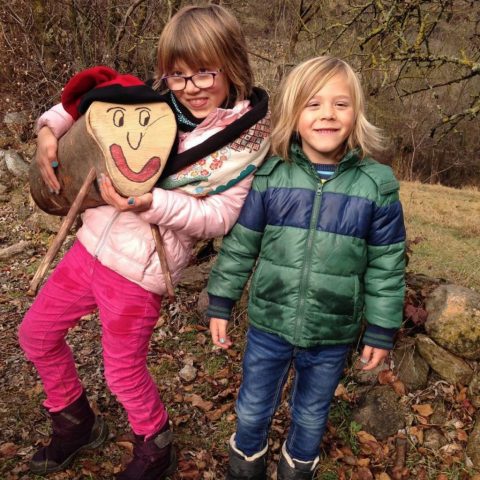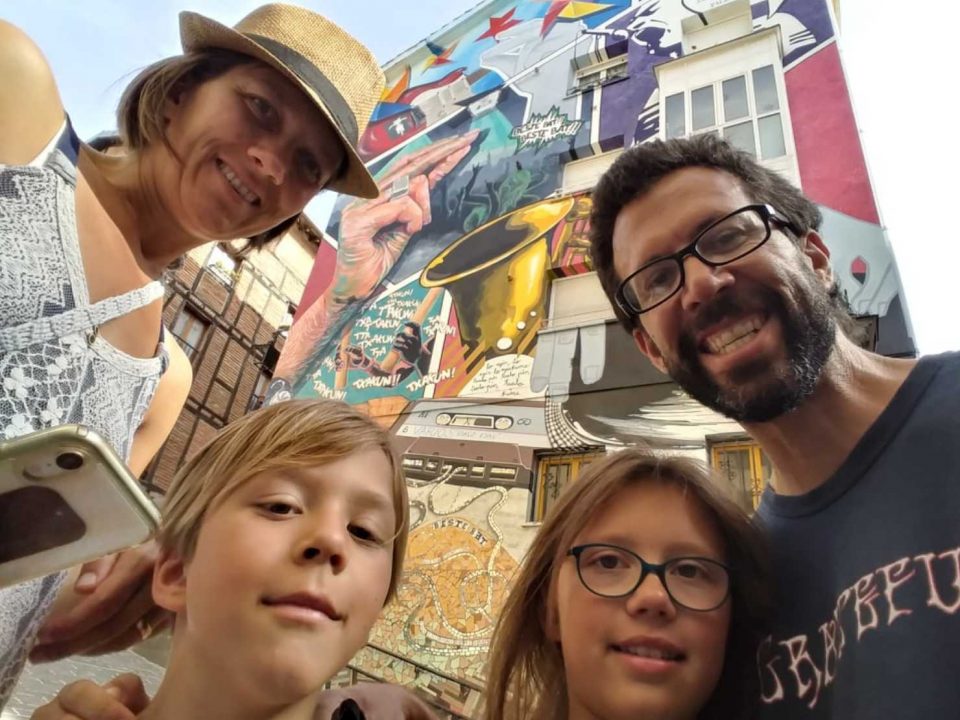
Leek Kimchi or Leekchi: Kimchi’s Mediterranean cousin
November 25, 2018
New Education: Out of the classroom and into the wild
February 6, 2019How we pulled our kids out of school and taught them to be world citizens
A few years ago my wife and I had the bright idea to sell our house, sell our business, sell our cars, pack up the kids, and head to Europe, where we would volunteer on organic farms in exchange for room and board. As we announced the plan to our friends, family, coworkers and finally our own parents, the response we got was for the most part very positive. I say for the most part, because we definitely heard voices of skepticism and disbelief, mostly from my in-laws.
Indeed, we did encounter a few obstacles, but we carried out the plan, and to this day my wife and I agree that it was possibly the greatest thing we ever did. For the last two years we’ve been settled in the Spanish Pyrenees, and from time to time we still get asked why we would ever want to leave California. Then I scroll through the news and read about another mass shooting, or see another friend or acquaintance launching a GoFundMe campaign to finance a vital medical procedure, and I am reassured.
But guns, healthcare and tweets from the Oval Office aren’t the only reasons we left our jobs, our home and our country behind. At that time, Obama was still in office, our son was approaching preschool age, and our daughter was about to “graduate” from the neighborhood Montessori preschool and kindergarten.
Where do we go from here?
We all loved that school immensely, and at the risk of sounding elitist, the thought of transferring to an ordinary public school did not entirely fill our hearts with joy. The fact is we couldn’t afford the tuition of a Montessori elementary school, but our locally designated elementary had some of the lowest test scores in the county. Not that I find standardized test scores thoroughly compelling, but I sort of wanted something better for my kids.
Also, our circle of friends seemed to be gravitating more and more towards less conventional methods, like homeschooling, and even unschooling. Now the first time I heard the term unschooling, I have to admit that the image of a frckled boy in denim overalls strumming on a banjo did flash before my eyes. But then my wife, who’s about the furthest thing from a backwoods hillbilly, spelled out a bit of the philosophy for me. I remained a bit skeptical, but I agreed to look into it and keep an open mind.
My wife was actually born, raised and educated in East Germany up to the age of 10, when Germany unified. It wasn’t until she was 24 that she moved to California as my wife. To me, she seemed to be the product of a truly brilliant educational system, but she wasn’t so sure. In any case, she wanted nothing but the best for our kids.
But we were already having trouble raising them bilingually, always swinging back to English, and that was a source of real frustration. And we knew that the longer we stayed in California, their chances of learning German would only grow smaller. This was a bit disappointing to both of us, and one more reason to consider going back to Europe.
Voices without borders
Very well educated Americans often don’t acquire anything beyond what they like to call “high school Spanish,” which is about enough to order a meal in Cabo San Lucas, where all the waiters speak English. In Europe, on the other hand, virtually everyone can speak at least two languages, if not three or four. And this is something my wife and I put a lot of value in, much more than, say, memorizing all the state capitals.
Not only do we believe that languages are becoming increasingly important in this era of globalization, but we understand that learning multiple languages builds connections in the brain that are very difficult to forge after a certain age. And those neural connections serve many other functions, well beyond just speaking another language. Moreover, multilingualism also brings with it a degree of multiculturalism, an awareness of and a sensibility to the great diversity of people with whom we share this planet.
And so, with an ongoing conversation about the value of languages and the merits of mainstream education, and all these ideas about unschooling and foreign schooling bouncing around in our head, we pressed on with our plan. And our plan, as it happens, consisted of little more than a vague vision in our eager, open minds. The idea was to sign up with a website like WWOOF or WorkAway, find hosts in Germany, France, and Spain, and take our kids on a month-to-month tour of unconventional farms and households of western Europe. (Check out my article on WWOOFing With Children to learn more about how that worked out.)
Carefully made plans
As for school—when, where and how—we had no plan. We just wanted to keep our options open. So when we confirmed that Germany’s strict law on mandatory education eliminated virtually any possibility of any version of homeschooling, we decided we wouldn’t be settling down in the old Fatherland after all. My wife’s family was none too pleased about that. But when they gradually came to understand that we meant to drag our kids around the continent for a whole year without enrolling them in school, they were practically outraged.
Ultimately, my wife and I agreed that the kind of education our daughter would receive sitting at a desk in room full of six-year-olds for nine months would not measure favorably against the kind of education she would gain by living with a dozen different families in a handful of countries speaking a multitude of European languages. In the end, we stand by that decision.
The growth and transformation we saw in our children, especially our six-year-old daughter who turned seven along the way, was just remarkable. Who’s to say what sort of development she would have undergone in a well-ordered classroom, but the blossoming of personality, the rise in self-confidence and the ability to connect with other people — we all tend to attribute to that year of adventure and discovery.
Unconventional Curriculum
Before, during and after our 12-month excursion, people were continually asking us, “So are you homeschooling your kids, or what?” To be perfectly honest, we never worried much about setting up a homeschooling curriculum for our children. Put kids in an unfamiliar environment, and you really can’t keep them from learning. It’s what our brains are programmed to do.
Of course, we had books and magazines we would read with our kids, and educational games on the iPad. And we would spend time every day reminding our kids what country we were in and what kind of work we were doing for that particular host. The learning never stopped. We also had some schoolbooks with exercises in them, but it seems like whenever our daughter caught on that we were trying to “teach” her something, that’s when she would resist.
These are some of the ideas behind what a lot of people now call unschooling. Leave the children to their own devices, and they will learn. It’s the same way they learn to walk, to talk, and to sneak out of the house when they get older. It’s not by teaching them.
Over the course of our work-exchange travels, we actually found a host in Austria that identified itself as the European headquarters for unschoolers. Now the headquarters for unschoolers may sound a little oxymoronic, something like the vice president for the society of anarchists, but these guys really had something going. They hosted meet-ups at least a couple times a year for unconventional families who practiced what they called free learning (which has a much nicer ring than unschooling). And we spent an amazing, eye-opening month we this very special family, but I’ll say more about that experience later.
By now you’re probably wondering, will this work for me? Should our family sell everything and leave the country? Can I go WWOOFing with my kids? If the security of a regular paycheck and a steadily growing retirement account are your top priorities, I would probably have to say no. Or if you’re the kind of person who thrives off of having a steady routine and a certain sense of predictability, I would again say no. Honestly, there are innumerable reasons why homeschooling, free learning, or WWOOFing might not be right for your family.
There are, in fact, a dizzying array of pros and cons that we too had to consider when deciding how to educate our children. And consider them we did.
End of the road and the start of something new
As the year drew to an end, we eventually had to face the big decision. My wife and I would have been more than happy to keep traveling, to keep meeting new people and discovering new ways of life. But our daughter was ready to settle down, have a place to call home, and make some friends that she wouldn’t have to say goodbye to after four weeks.
And so we brought the tour to an end. As good a time as we were having, we had no intention of turning this into some sort of social experiment on our children. It was a journey of consent, and a search for happiness. Everybody had a voice. So now we just had to settle on landing site. Of the many remarkable landscapes and incredible communities we had discovered over the year, which we would choose to call home?
Clearly we would have to revisit that great list of pros and cons, examining our priorities and scrutinizing our choices. If we’d stayed in California, we still would have had a variety of schooling options to think about. But nothing would have forced us to perform the kind of careful assessment and collective decision making that we were about to embark on. And that is something every family ought to do once in a while.
TO BE CONTINUED
Read PART II: Out of the classroom and into the wild.
For more informative and entertaining stories about our unconventional schooling experiences, be sure to check out our articles on Old World Learning, More On Homeschooling, Freeschool and Roadschool. You might also enjoy these stories about Cultural Integration and Digital Nomads.






1 Comment
[…] Series of blog posts on one families experience […]